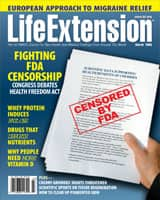- Science & Research
- Science News
- Newsletter
- 2006
- March 11

Newsletter
Newsletter
More vitamin C means less inflammation
 | ||||||||||||||||||||||||||||||
| ||||||||||||||||||||||||||||||
| ||||||||||||||||||||||||||||||
| Life Extension Update Exclusive More vitamin C means less inflammation The March, 2006 issue of The American Journal of Clinical Nutrition published the findings of UK researchers of an association between dietary and plasma levels of vitamin C and reduced markers of inflammation and endothelial dysfunction in older men. S. Goya Wannamethee and colleagues studied 3,258 men between the ages of 60 and 79 who had not been diagnosed with heart attack, stroke, or diabetes. Responses to food frequency questionnaires provided information concerning vitamin C intake. Blood samples were analyzed for plasma vitamin C, the inflammatory marker C-reactive protein, tissue plasminogen activator (t-PA) antigen, which is a marker of endothelial dysfunction (abnormal function of the lining of the blood vessels); and other factors. It was found that higher plasma vitamin C levels, greater fruit intake, and greater vitamin C intake were all correlated with lower levels of C-reactive protein and t-PA. High vegetable intake was associated with a reduction in t-PA but not C-reactive protein. Men whose plasma vitamin C was in the highest one-fourth of participants had a 44 percent less risk of having elevated C-reactive protein and a 21 percent lower risk of an elevated t-PA than those whose levels were in the lowest fourth. For those whose fruit intake was in the top quarter the risk of having either factor elevated was 24 percent lower than that of men whose fruit intake was in the bottom fourth. Additionally, higher plasma vitamin C levels were associated with reduced blood viscosity and fibrinogen concentrations. “Several studies have reported that vitamin C can improve endothelial dysfunction in smokers, hypertension patients, and patients with coronary artery disease,” the authors write. “Our finding is consistent with a protective effect of vitamin C on endothelial function, which could be mediated by the effects of vitamin C on low-grade inflammation, effects that may result from its antioxidant properties. The New England Journal of Medicine published several studies in the year 2000 showing that the blood indicators of inflammation are strong predictive factors for determining who will suffer a heart attack (Lindahl et al. 2000; Packard et al. 2000; Rader 2000). The January 2001 issue of Life Extension magazine described these studies and explained how individuals could protect themselves against these inflammatory markers (such as C-reactive protein, homocysteine, and fibrinogen). A critical inflammatory marker is C-reactive protein. This marker indicates an increased risk for destabilized atherosclerotic plaque and abnormal arterial clotting. When arterial plaque becomes destabilized, it can burst open and block the flow of blood through a coronary artery, resulting in an acute heart attack. One of the New England Journal of Medicine studies showed that people with high levels of C-reactive protein were almost three times as likely to die from a heart attack (Ridker et al. 1997). Those who are in relative good health, but have elevated C-reactive protein, can try to lower it using a variety of diet modifications, supplements and/or drugs. Supplements such as vitamin E, borage oil, fish oil, DHEA, vitamin K and nettle leaf extract can lower C-reactive protein. Diets low in arachidonic acid, omega-6 fatty acids, saturated fats, high-glycemic food and overcooked food can suppress inflammatory factors in the body. C-reactive protein is not only an inflammatory marker, but also directly damages the endothelium. Chronic inflammation, as evidenced by persistent high levels of C-reactive protein, creates initial injuries to the endothelium and also accelerates the progression of existing atherosclerotic lesions. Featured Products
Life Extension magazine March 2006 issue now online!
Reports On the cover: Why is the FDA picking on cherries? How whey promotes weight loss, by Will Brink What Europeans are doing to limit migraine frequency, by Russell Martin Vitamin D: Cancer prevention and other new uses, by Russell Martin Astonishing advances in tissue regeneration, by Heather S. Oliff, PhD Departments As we see it: FDA threatens to raid cherry orchards, by William Faloon In the news: Fruits, vegetables may guard against Alzheimer’s; Obesity linked to inflammation and heart disease; Apigenin inhibits prostate cancer growth; Psyllium supports healthy blood sugar, lipids; Lipoic acid protects central nervous system; Resveratrol found to stop flu virus in cell culture study; Malnutrition is epidemic, overlooked among elderly. All about supplements: Selenium, by Ben Best Ask the doctor: Preventing and managing skin pigmentation disorders, by Gary Goldfaden, MD March 2006 journal abstracts: Vitamin D, cherries, tissue regeneration, whey protein | ||||||||||||||||||||||||||||||
Questions? Comments? Send them to ddye@lifeextension.com or call 1-800-678-8989. For longer life,  Dayna Dye Sign up for Life Extension Update at Subscribe Help spread the good news about living longer and healthier. Forward this email to a friend! View previous issues of Life Extension Update in the Newsletter Archive. | ||||||||||||||||||||||||||||||
The latest news on aging, nutrition, and vitamins
Lab
Testing
How Life Extension lab testing works



